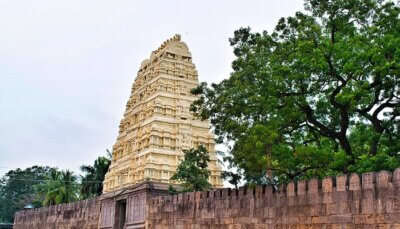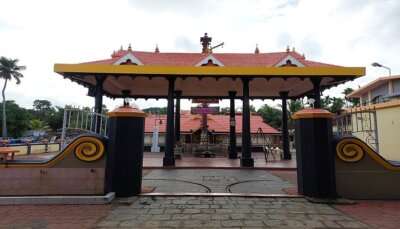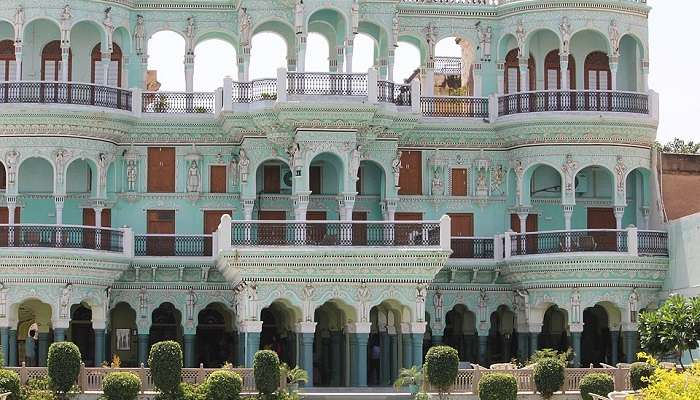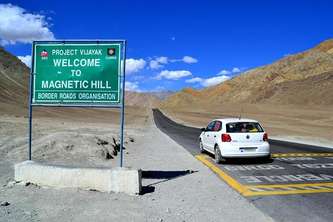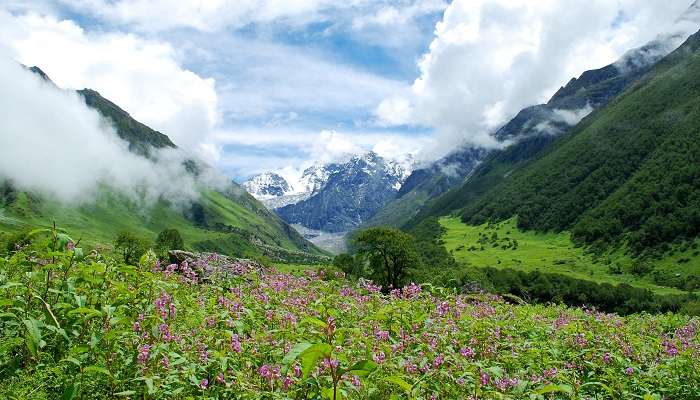Exploring Mookambika Temple In Kollur And Unveil Its Mystical Charm
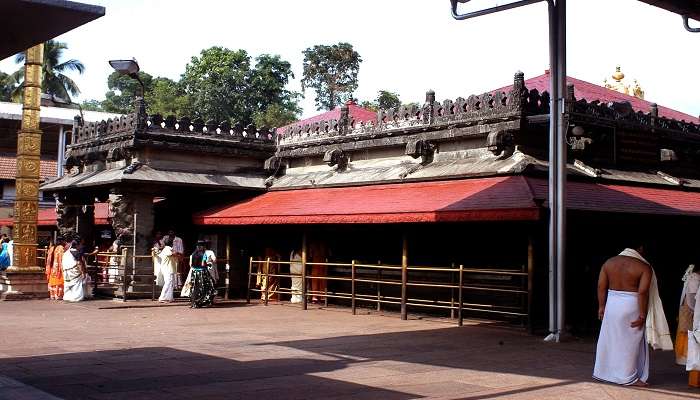
More precisely known as the Kollur Mookambika Temple, it is a popular Hindu pilgrimage site nestled amidst the Western Ghat’s lush greenery. The temple’s location is more accurately in Kollur, a quaint village in the Udupi district in Karnataka. The temple’s grandeur is a testament to ancient heritage and religious fervour. Dedicated to Goddess Mookambika, the temple holds a significant reverence among the devotees. Thousands of devotees visit the temple each year to seek blessings and be mesmerised by the temple’s intricate architecture.
History And Mythology Of Mookambika Temple
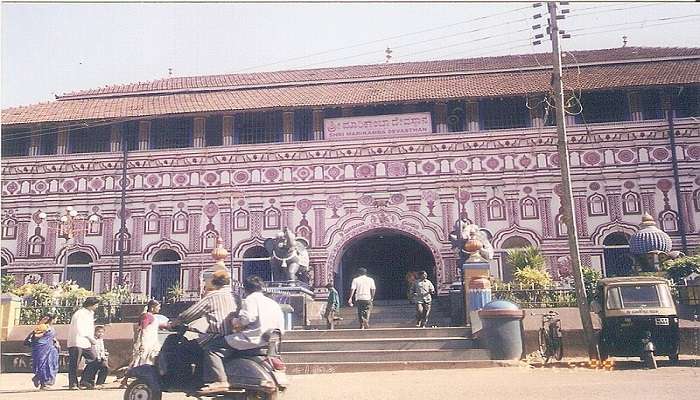
The Mookambika Temple is dedicated to Goddess Mookambika, a manifestation of Adi Parashakti, the divine feminine energy.According to historians and scriptures, the temple dates back to the 8th century and symbolises antiquity and devotion. Legends suggest that the temple was founded by the great Hindu philosopher and saint Adi Shankaracharya in the 8th century AD.
Mythology depicts that Adi Shankaracharya was meditating at the nearby Kodachadri peak. He acquired the vision of witnessing Goddess Mookambika in front of him, in the form of Jyotirlinga. It was then that he installed the goddess’s idol in the temple, and now people from across the world visit and explore the temple and seek blessings.The Mookambika Temple history also discusses the demon Mookasura, who was vanquished by the goddess. Then, the Goddess earned the name “Mookambika,” which translates to “slayer of Mookasura.”
All of these stories, historical significance, and mythological tales surrounding the temple contribute to the temple’s spiritual significance.
Must Read: Kabini Wildlife Safari
What Is The Best Time To Visit The Mookambika Temple?
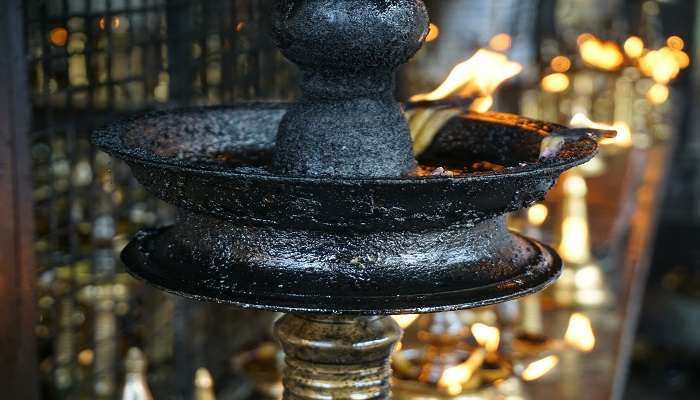
Unlike many Hindu temples that are often closed during certain times of the year, the Mookambika temple in Kollur is open around the year. You can visit any time at your convenience to seek blessings from the Goddess. However, if we had to suggest an “ideal time” to visit, it would be between September and October. The temple is at its maximum beauty and grandeur during Navratri, a nine-night festival dedicated to the worship of Goddess Durga. During this period, you get to witness grand celebrations that take place inside the temple’s premises.
For tourists who prefer less crowd and less hassle, off-peak seasons are also a great time to visit the Sree Mookambika temple. This includes the period during the monsoon season between June and August. The rush is less and the slight drizzle accentuates the beauty of the serene and verdant surroundings. Also, tourists on a budget can consider visiting during the off-season for better and cheaper deals on their transportation tickets and accommodation.
Essential Information About Visiting Mookambika Temple
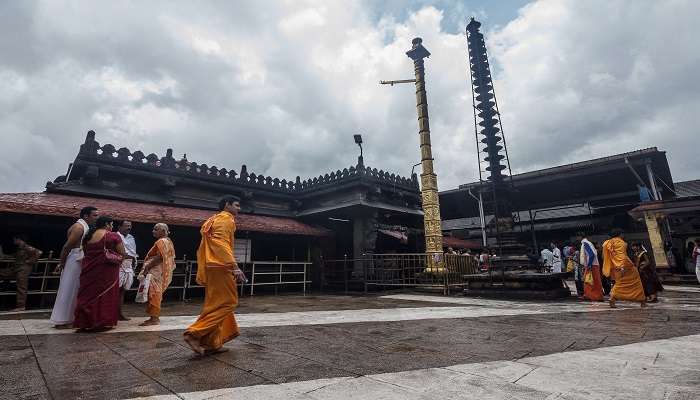
Before finalising your trip to the Mookambika temple, you must be aware of certain factors. From timing to basic etiquette, you have to prioritise several factors. This ensures the optimal quality of the visit and darshan without violating any rules.
Temple timings
The temple is open 24/7 for its devotees. So, you can step inside, explore, and soak in the calmness and peace of the place at any time. However, if you want to do the darshan of the Goddess, the Mookambika temple timings are from 05:00 AM to 09:00 PM.
Entrance fees
Like most Hindu temples across India, visiting the Mookambika temple doesn’t cost a penny. However, you might have to pay to secure the “puja thalis” and essentials like prasad, flowers, incense sticks, etc.
Dress code
Two factors must be considered when visiting a temple in India: Modesty and Decorum. You want to respect and honour the temple’s rules and regulations. The dress code of Mookambika temple is strict.
For women
Sarees, salwar suits, or traditional Indian attires are allowed for women inside the temple. Any revealing outfit like short skirts, revealing tops, most Western clothes, etc. aren’t allowed inside the temple. You will also need to cover your head with some fabric, be it a dupatta or shawl.
For men
Dhoti, mundu, shirt, trousers, kurta, etc. are encouraged and advised for men. However, offensive language or graphics on shirts or T-shirts aren’t allowed inside the temple.
Footwear
Devotees should leave their footwear outside before stepping inside the temple. There are designated spots outside the temple where they can “deposit” or “store” their shoes for safekeeping.
Note: Always familiarise yourself with the cultural significance of the temple and dress appropriately to avoid any consequences.
Other Etiquette And Rules
Photography is usually not allowed inside the temple, especially when you are entering the primary sanctum. Additionally, the devotees are expected to maintain silence when inside the temple to ensure a peaceful environment. Ill habits like smoking, chewing tobacco, drinking alcohol, or eating non-vegetarian foods are prohibited.
Suggested Read: Hotels In Hampi
What To Do In Mookambika Temple?
Now that you have a better idea about the Mookambika temple story, it makes sense that you want to plan the trip ahead of time. As you step inside the temple, you get to partake in multiple spiritual and religious experiences. Some of the must-try experiences in the temple include:
1. Darshan
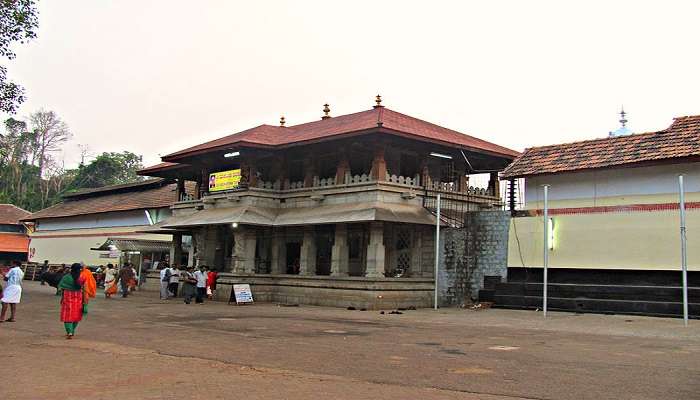
To be fair, this is the sole reason thousands of devotees and pilgrims visit this temple each year. As you stand under the scorching sun in the designated line, your goal is to enter the temple premises and witness the divine idol of the Goddess. Many devotees exclaim having a profound and ethereal feeling when they witness the idol for the first time.
2. Abhishekam
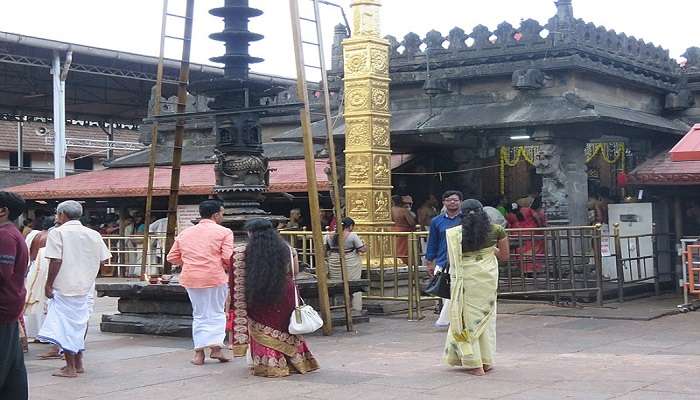
Another powerful ritual you should be a part of is the Panchamrutha Abhishekam. The ritual happens not just for Goddess Mookambika but for every deity residing on the temple premises. Usually, the Abhishekam ritual takes place at 07:30 AM every day.
Suggested Read: Places To Visit From Bangalore For 3 Days Trip
3. Offerings And Prayers
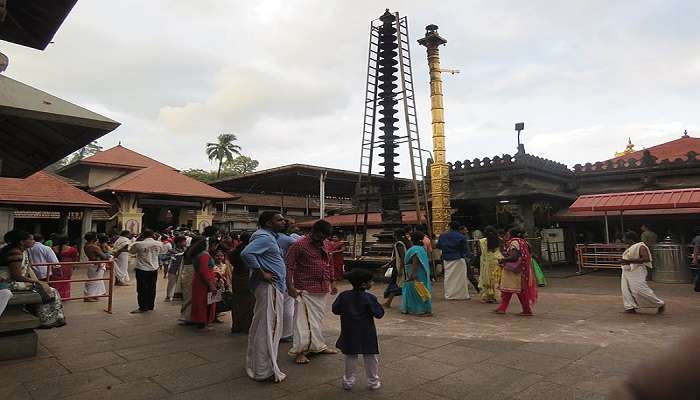
Once you are done with the darshan, you can step aside and offer your prayers individually. You can do so by offering flowers, lighting lamps, and incense sticks, or reciting mantras while on the temple premises. The choice of offering is entirely yours to make.
4. Exploring The Temple
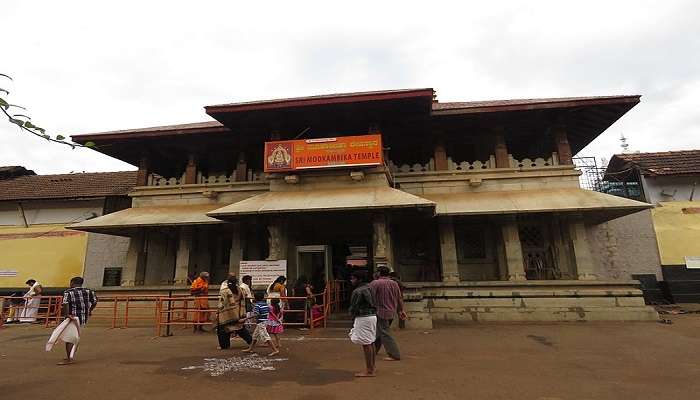
Besides witnessing the puja of Goddess Mookambika and other deities in the temple, you must take a stroll around the premises. The religious and spiritual significance of the place is immaculate and so is the architecture. The intricate carvings on the walls and pillars are a true testament to the talent of the creators of the temple.
Note: There are specific timings for Seva and Mahaprasad distribution. Always confirm those timings at the inquiry as you enter the temple.
Suggested Read: Places To Visit In Kanakapura
Places to Visit Around Mookambika Temple
When you are in Kollur visiting the Mookambika temple, it makes sense for you to club other places in the itinerary so you can cover more in a day.
Following your darshan in the Mookambika temple, head over to:
1. Kodachadri Peak
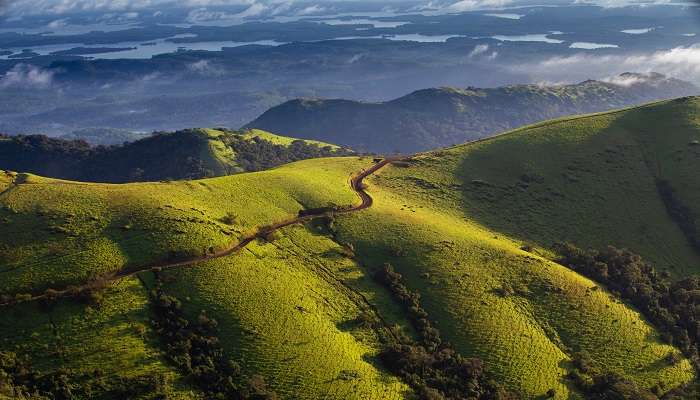
The peak is known for its scenic beauty, lush greenery, and its spiritual significance associated with Adi Shankaracharya. However, despite the charm of this peak, one thing that sets tourists off is the trek. It is quite challenging but well worth the try.
2. Sharadamba Temple, Sringeri
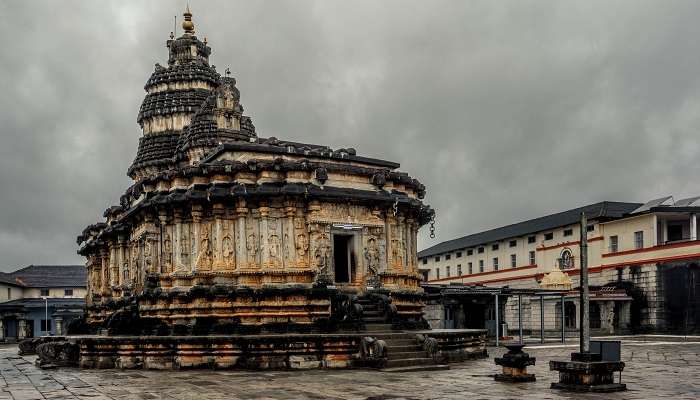
Another revered pilgrimage site established by Adi Shankaracharya is the Sharadamba temple. It is dedicated to the Goddess of Wisdom. You can visit this temple after your darshan at Mookambika temple.
Suggested Read: Coorg In Monsoon
3. Maravanthe Beach
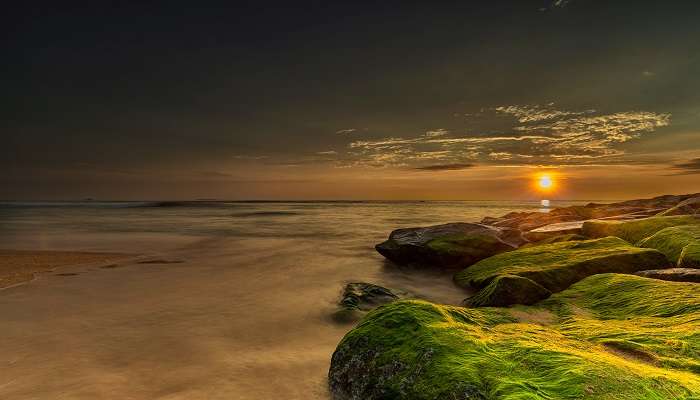
The beach is located around 38 km away from the temple. Once you are done with your darshan at the temple, go down to the beach for a relaxing day. The golden sand beach and the azure Arabian Sea offer a picturesque location to relax and rejuvenate.
Further Read: Places To Visit In Sirsi
Now that you have all the details about Mookambika temple darshan timings and its history, it’s time to plan your next trip to Karnataka without further thinking. Besides the religious sites, many natural beauty and retreats are awaiting your presence. So, why wait any further?
For our editorial codes of conduct and copyright disclaimer, please click here.
Cover Image Source: Shutterstock
Frequently Asked Questions About Mookambika Temple
What is special about Mookambika Temple?
The Mookambika temple, located in Kollur, Udupi, is dedicated to Goddess Mookambika, who represents strength and emotional power.
Which state is Kollur Mookambika in?
Mookambika temple is located in a small village named Kollur, which is in Udupi district in the state of Karnataka, India.
What is the power of Kollur Mookambika?
According to legends and mythology, Goddess Mookambika is the ultimate source of power who restores balance in the world and is responsible for being the source of life and the force running the world.
What are the special days of Mookambika?
The most special day to visit and explore the Mookambika temple is during Navratri, especially on Vijaya Dashami.
What are the benefits of worshipping Goddess Mookambika?
Praying and worshipping Goddess Mookambika provides protection and helps individuals overcome obstacles and limitations in their lives.
People Also Read:
Kartik Swami Temple Triyuginarayan Temple Meenakshi Temple
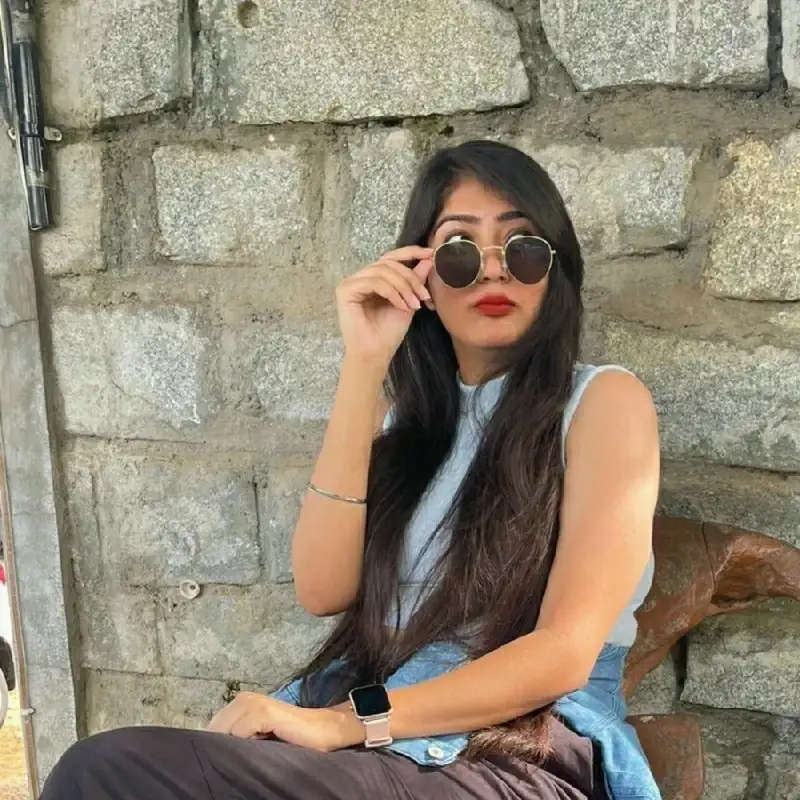
Experience the world through captivating stories of adventure and travel. As a senior content writer, I bring my passion for exploration to life, crafting tales that take you on a journey. With my words, you’ll feel the thrill of discovery and the joy of experiencing new cultures. Let me turn your imagination into a reality with stories that inspire you to explore and embrace the world.



